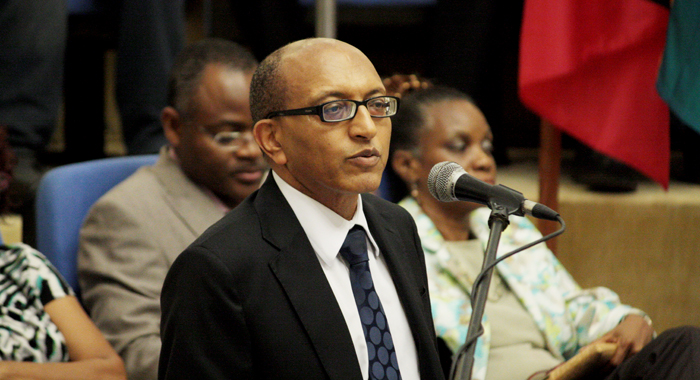
Smallholder farming, which is the backbone of many African economies, is set to be transformed by a combination of investment and increasing access to information and communication technologies (ICTs), particularly mobile phones.
This view was expressed Tuesday by Michael Hailu, Director of the Technical Centre for Agricultural and Rural Cooperation (CTA) at ICT4Ag, a major conference on ICTs in agriculture.
“On this continent, 65 per cent of the workforce is employed in agriculture and the sector generates 32 per cent of GDP. Smallholder farmers, mostly women, produce 80 per cent of Africa’s food. African countries spend up to US$ 50 billion a year on food imports. With abundant land, water and cheap labour, there is no good reason why Africa should import so much food.
“Yet there’s good reason to be optimistic. After years of neglect, governments and the private sector are increasing investments in agriculture. Nevertheless, to achieve its full potential, smallholder agriculture must be transformed from a subsistence activity to a profitable, sustainable business. ICTs play a vital role in this transformation. They provide timely advice and information. They help farmers increase productivity. They make markets more efficient. And they increase incomes along the value chain”.
The CTA Director said, “the phenomenal growth in the number of mobile phone subscribers in Africa in recent years shows that change was on the way. In 2000, there were just 16.5 million mobile subscriptions in Africa. Now, there are over 650 million. Indeed, the number of people on the continent with access to mobile phones exceeds the number with access to clean water, electricity or a bank account”.
Hailu was speaking at “ICT4Ag: The Digital Springboard for Inclusive Agriculture” Conference, which is being organised by CTA, the Rwandan Ministry of Agriculture and Animal Resources (MINAGRI) and the Ministry of Youth and ICTs (MYICT). The conference is taking place in Rwanda, a country where 80 per cent of the working population are employed in agriculture but where the government of President Paul Kagame has also invested heavily in agriculture and ICTs as part of its “Vision 2020” agenda to turn Rwanda into a middle-income country. Last week, the Rwandan Government announced that a new network will provide high-speed broadband access to 95 per cent of the country’s population within three years.
Rwandan ministers attending the conference shared the upbeat mood. Dr. Agnes Matilda Kalibata, Rwanda’s Minister of Agriculture and Animal Resources, reminded the audience of the significance of agriculture in poverty reduction: “Agriculture is a low hanging fruit for poverty reduction. With 40 – 65 per cent employment in this sector in ACP Countries, any investment will have a huge impact on the economy”.
She also emphasized the importance of ICT in transforming agriculture.
“Rwanda has committed to transforming the country through ICT. Information and communication technologies (ICTs), social media, Web 2.0 and mobile applications are changing the face of agriculture and rural development in many countries. The use of mobile devices is transforming the communication landscape through dissemination and sharing, and is changing the way we do business. This conference presents an opportunity for participants, Rwandans in particular, to harness the use of ICTs in agriculture and is very much in line with the national vision of making Rwanda an ICT hub in the near future”.
Participants at the ICT4Ag conference — including agricultural experts, farmers, young innovators, ICT companies and government officials — are focussing their attention on improvements to agriculture that can be brought about by technological innovation, capacity building and creating enabling policies and infrastructure. Key issues for discussion are the role of youth and the encouragement of entrepreneurship; the inclusion of farmers in decision-making, information and crowdsourcing; and connectivity.
Jean Philbert Nsengimana, Minister of Youth and ICT of Rwanda, said:
“This day is a culmination of more than 10 years of consistent investments in ICT4D policy and strategy formulation, infrastructure development, mobile penetration, education and value added services development in parallel with agriculture modernisation efforts”.
The CEO of the Rwanda Development Board, Ambassador Valentine Rugwabiza, also a Cabinet member, highlighted the synergies between ICT and investment and also emphasised that indeed ICT is only a tool whose importance will be derived from how well it is used.
Hailu stressed, however, that a major part of the key to securing the potential benefits of ICTs and investment in African agriculture was likely to be the extent to which countries are successful in harnessing the creative input of two key sectors: young entrepreneurs and women.
“Access to ICTs is not uniform”, he said, “and there is a digital divide. There is a significant gender imbalance, with men having better access to ICTs than women. And rural areas are significantly underserved compared to cities”.
He described the importance of young people as “pivotal”.
“Young people have the greatest aptitude for using ICTs, whether it’s to communicate or develop new apps to improve agricultural productivity or access faraway markets. Africa’s youth must therefore play a pivotal role in the transformation of smallholder agriculture.
“ICTs — in particular mobile devices — have opened up unprecedented opportunities for agricultural and rural development. This development can offer a bright future for millions of women and men who derive their livelihood from farming and other forms of rural employment. Farmers, even in the remotest locations, can easily and readily access vital information on weather, market prices, pests and diseases as well as input prices.
“It is not just about linking farmers to markets or creating employment opportunities for young people. Social media also provide a platform for rural communities to contribute to policy-making”.
Addressing the media CARICOM’s Deputy ICT Manager, Jennifer Britton said the ACP has much to learn from each other and that the opportunity to meet and share comes at a good time when agriculture is high on the Caribbean’s agenda.
More than 500 participants from 63 countries, including from Caribbean and Pacific nations, are attending the conference





